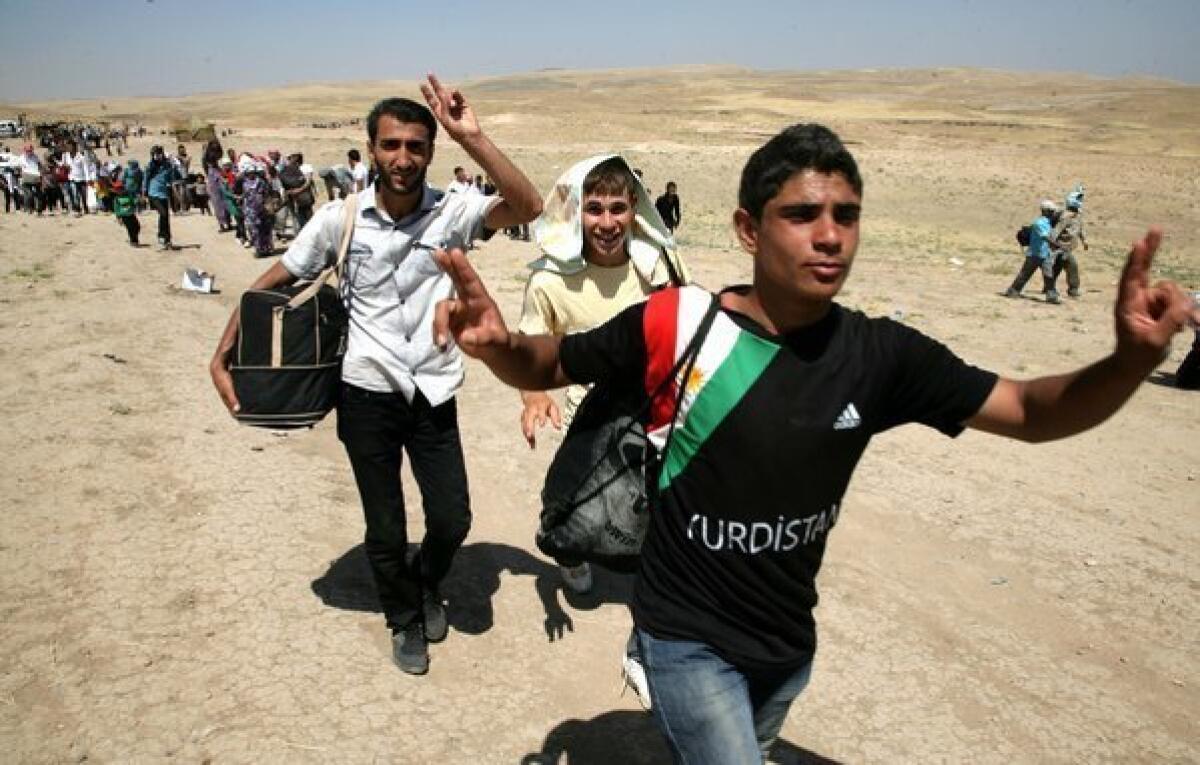Syrian refugees flee amid clashes between Kurds and Islamist rebels

- Share via
BEIRUT -- Thousands of Syrians, mostly ethnic Kurds, crossed from Syria into Iraq on Monday in what has become one of the largest sustained refugee flows in the more than two years since the Syrian conflict began.
They are not fleeing clashes between government forces and rebels, but are running away from a spinoff conflict: the raging battle between Kurdish militiamen and Islamist Arab rebels for control of large swaths of northern Syria, home to most of Syria’s Kurdish minority.
The Syrian government pulled back from the vast region more than a year ago, leaving a void for Kurdish activists who have long sought greater autonomy and complained of discrimination.
But long-standing hostility between Kurdish militiamen and Arab rebel brigades, some linked to Al Qaeda, has broken into open warfare in certain areas of northern Syria, with reports of massacres, beheadings and other atrocities. Some Arab rebels accuse the Kurdish fighters of collaboration with the government of Syrian President Bashar Assad, an allegation denied by the Kurds.
The conflict between the Kurds and Arab jihadis highlights how some “liberated” zones of Syria have become battlegrounds between various armed factions with distinct agendas and varying views on what a future Syria should look like.
Since Thursday, more than 20,000 people, mostly women, children and the elderly, have fled from northern Syria into the autonomous Kurdish region of Iraq, according to the United Nations. [Updated, 2:05 p.m. PDT Aug. 19: Later Monday, the U.N. revised the number of recent refugees to almost 30,000.]
“What you’re looking at here is the biggest influx across a single border possibly in the whole Syrian crisis,” said Adrian Edwards, a spokesman in Geneva for the U.N. refugee agency
Iraqi officials opened the border to refugees Thursday after the frontier had largely been closed for months. The move opened the floodgates for a new wave of often bedraggled Syrians, taxing the resources of the Iraqi government and of aid agencies in a region ill-equipped to deal with the massive influx.
Multitudes walked for miles to the border and then crossed into Iraq on a pontoon bridge spanning the Tigris River. Once in Iraq, aid workers say, many mill about for hours in the intense desert heat, with temperatures above 100 degrees, until they can be registered and placed in a camp, mosque, school or other temporary shelter. Some have relatives in Iraq who will take them in.
The U.N. and the International Rescue Committee have helped erect a tent city that serves as a transit camp and, along with Iraqi authorities, have been helping to provide water, food and other assistance to the displaced Syrians.
Since the conflict erupted in March 2011, more than 2 million Syrians have fled their war-ravaged nation. Most have crossed into Jordan, Turkey and Lebanon, all bursting with massive populations of Syrian refugees. In recent months, however, flows to these nations have slowed considerably as authorities there have made it more difficult for Syrians to enter.
But the new flight from northern Syria has added substantially to the more than 150,000 Syrians who had previously fled into Iraq. Officials of the Kurdish regional government are bracing for more arrivals in coming days.
[Updated, 11:32 a.m. PDT Aug. 19: Massoud Barzani, the president of Iraq’s Kurdistan region, publicly threatened this month to intervene in Syria to defend the Kurdish population there, saying the Kurds were “under threat of death and terrorism.”
On Monday, Barzani urged his Kurds in Syria to remain there and “defend their land,” voicing fears that northern Syria could be “emptied of its Kurdish residents,” reported Asharq Al Awsat, the pan-Arabic daily.]
ALSO:
Indian train plows into crowd, kills at least 28
Mexican drug lord’s release reopens wounds for victims’ relatives
Former Egyptian leader Hosni Mubarak may be freed from jail soon
Twitter: @mcdneville
More to Read
Sign up for Essential California
The most important California stories and recommendations in your inbox every morning.
You may occasionally receive promotional content from the Los Angeles Times.










